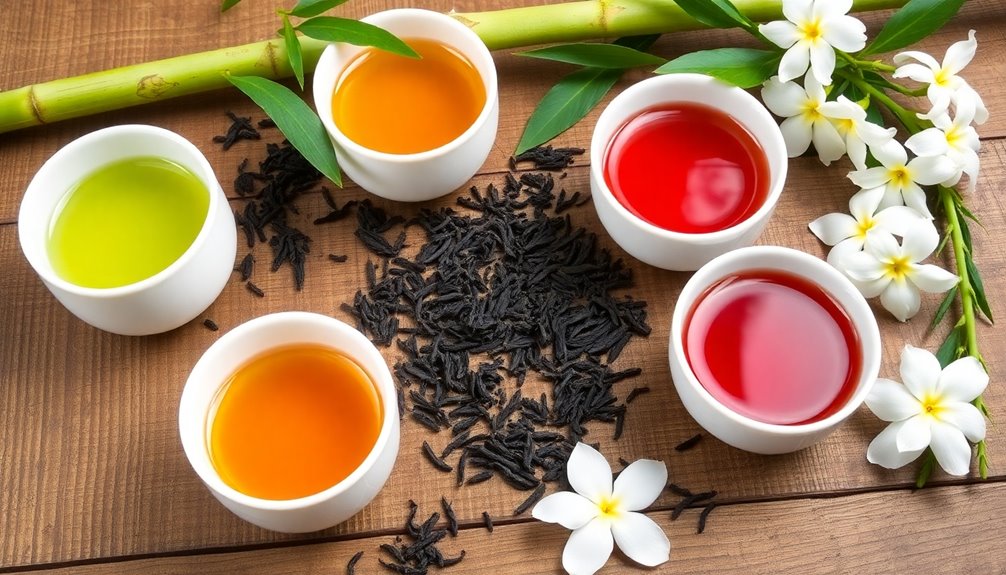Antioxidants in tea, especially polyphenols like catechins and EGCG, help protect you from diseases by fighting oxidative stress. These powerful compounds scavenge harmful free radicals, lower LDL cholesterol, and reduce inflammation. Regularly sipping green tea can lead to improved heart health and a lower risk of chronic illnesses like cancer and diabetes. Additionally, the antioxidants enhance your body's natural defenses, promoting overall wellness and longevity. To get the most benefits, pay attention to tea type and preparation. There's so much more to discover about how tea can boost your health, so keep exploring its amazing properties.
Key Takeaways
- Antioxidants in tea, particularly catechins and EGCG, lower LDL cholesterol and reduce inflammation, promoting heart health and preventing cardiovascular diseases.
- Regular tea consumption is linked to improved glycemic control, reducing the risk of type 2 diabetes.
- Polyphenols in tea scavenge reactive oxygen species, decreasing oxidative stress and lowering chronic disease incidence.
- High antioxidant levels in green tea support cancer prevention and enhance overall well-being and longevity.
- Consuming tea as part of a healthy lifestyle is associated with lower rates of neurodegenerative disorders and chronic diseases across various cultures.
Introduction

When you sip a cup of tea, you're not just enjoying a warm beverage; you're also indulging in a powerhouse of antioxidants. Green tea, in particular, is packed with polyphenols like catechins and EGCG, which combat free radicals. These harmful molecules can lead to cellular damage and increase the risk of chronic diseases.
By incorporating green tea into your daily routine, you may significantly reduce your chances of developing conditions like heart disease and cancer.
Research shows that drinking three cups of green tea daily is linked to an 11% decrease in heart attack rates. The antioxidants in green tea can lower LDL cholesterol levels and reduce inflammation, promoting better cardiovascular health.
Additionally, these powerful compounds have been shown to inhibit cancer cell growth, contributing to lower cancer rates in populations that consume higher amounts of green tea.
Moreover, green tea's polyphenols improve glycemic control, aiding in the management of blood sugar levels in those with type 2 diabetes.
With these numerous health benefits, making green tea a staple in your diet can be a simple yet effective way to protect your overall health.
Tea's Rich Polyphenol Content

Tea's rich polyphenol content, especially in green tea, makes it one of the most effective sources of antioxidants available. The catechins in green tea, which account for 18% to 36% of the dry weight of tea leaves, are particularly notable. Among these, epigallocatechin gallate (EGCG) stands out, contributing around 59% of total catechins and showcasing powerful antioxidant properties. Regular consumption of herbal tea can also complement the benefits of green tea by providing additional antioxidants through various plant compounds. Herbal teas are particularly known for their unique flavors and benefits, which can enhance overall health. Furthermore, rooibos tea is rich in antioxidants, adding to the diversity of options available for boosting your health. Additionally, herbal teas like chamomile and ginger may help alleviate menstrual discomfort, further contributing to the overall benefits of tea.
By regularly consuming tea polyphenols, you can significantly lower oxidative stress markers and reduce your risks of chronic diseases such as cardiovascular issues and certain cancers. The antioxidant activity of these compounds involves scavenging free radicals, inhibiting lipid peroxidation, and regulating antioxidant enzyme levels, all of which lead to impressive health benefits. Additionally, oolong tea, known for its rich antioxidants, can further promote overall health and provide essential benefits beyond those found in green tea.
In fact, a daily intake of polyphenols from tea can help you meet the recommended levels, with countries like Japan deriving up to 34% of their total polyphenol intake from green tea alone.
Polyphenols Combat Oxidative Stress

Regularly consuming polyphenols, especially catechins like EGCG from green tea, effectively combats oxidative stress in your body. These powerful antioxidants scavenge reactive oxygen species (ROS), reducing the harmful effects of oxidative stress.
By incorporating green tea into your daily routine, you can enhance the activity of vital antioxidant enzymes like superoxide dismutase (SOD) and catalase, which protect your cells from oxidative damage.
Studies show that regular green tea consumption is linked to lower levels of oxidative stress markers, which are often associated with chronic diseases such as cardiovascular disease and cancer. The polyphenols in green tea also have the ability to chelate transition metals, preventing the formation of free radicals that contribute to oxidative damage.
Epidemiological research suggests that individuals who consume high amounts of green tea experience a lower incidence of diseases related to oxidative stress, including neurodegenerative disorders and various cancers.
Cultural Significance of Tea Antioxidants

Emphasizing its rich history, tea has been cherished for over 3,000 years, particularly in China, where it's renowned for its health benefits, including potent antioxidant properties. The global tea market was valued at approximately $200 billion in 2022, reflecting its widespread consumption and cultural importance. Additionally, many sustainable brands in the coffee culture emphasize the importance of ethical sourcing, aligning with the values of health-conscious consumers.
Across various cultures, the cultural significance of tea, especially green tea, is profound. In Japan, for instance, green tea practices are woven into rituals and ceremonies, highlighting its role as a source of antioxidants and overall well-being. Research indicates that coffee's health benefits also stem from its antioxidant content, which further emphasizes the importance of these compounds in promoting health. The preparation and serving of tea often reflect a commitment to mindfulness and respect, enhancing the overall experience and appreciation of this ancient beverage.
You mightn't realize it, but green tea contributes to about 34% of daily polyphenol intake in countries like Japan, underscoring its importance in health and disease prevention. Studies show that populations with high tea consumption often exhibit lower rates of chronic diseases, which reinforces its status as a health-promoting beverage. Traditional beliefs align with modern research, emphasizing that the antioxidants in tea, particularly catechins, are crucial in combating oxidative stress—a common factor in many diseases. Additionally, the health benefits of ginger lemon tea can further enhance antioxidant intake, providing a delicious way to support overall wellness.
This intersection of tradition and science enhances tea's cultural significance as a medicinal drink, encouraging you to appreciate not just its flavor but also its remarkable health benefits.
Variability in Antioxidant Potency

Understanding the variability in antioxidant potency is essential for maximizing the health benefits of your tea. Green tea, in particular, is rich in polyphenols, especially catechins like EGCG, which contribute to its powerful antioxidant effects. However, the antioxidant content can vary significantly based on several factors. Different types of tea, processing methods, and specific cultivars can all influence the levels of these beneficial compounds.
Brewing methods also play a crucial role. The temperature and steeping time can greatly affect how much antioxidant is extracted from the leaves. Research shows that a typical cup of green tea can provide between 50-150 mg of antioxidants, illustrating this variability.
Moreover, your individual response to tea's antioxidants may differ depending on genetic factors, age, and overall diet. These elements impact how efficiently your body absorbs and utilizes these compounds.
Additionally, the bioavailability of tea polyphenols can be influenced by interactions with other dietary components, like fats and proteins, which may enhance or inhibit their antioxidant action. Understanding these nuances can help you choose the best tea and brewing method to optimize your antioxidant intake.
Practical Applications

Tea's remarkable health benefits extend beyond mere enjoyment, offering practical applications that can enhance your well-being. Incorporating green tea into your daily routine is a simple yet effective way to unleash its powerful antioxidants, particularly epigallocatechin gallate (EGCG) and polyphenols. Research shows that drinking three cups of green tea daily can reduce heart attack rates by 11%, showcasing its protective role against cardiovascular disease. Additionally, studies suggest that risk management strategies can be beneficial when considering various health investments, including dietary choices.
Moreover, the polyphenols in green tea improve glycemic control, making it a smart choice for those managing type 2 diabetes. Regular consumption can lead to lower fasting blood glucose levels, aligning with the principles of the Law of Attraction that emphasize positive habits for better health. Interestingly, similar benefits can be found in yerba mate, which is also rich in antioxidants and polyphenols. Engaging with educational toys during early childhood can foster cognitive development and creativity, reinforcing the idea that proactive choices in various aspects of life contribute to overall well-being.
Additionally, the anti-inflammatory properties of catechins may bolster liver health, helping prevent liver diseases. This aligns with the holistic approaches to well-being that are increasingly recognized in the personal development industry.
For those aiming for longevity, studies indicate that consuming five or more cups of green tea daily correlates with lower mortality rates. Furthermore, combining green tea with anti-inflammatory breakfasts may enhance its health-promoting effects.
By embracing green tea, you not only enjoy a delightful beverage but also proactively support your health against chronic diseases like cancer.
Conclusion
Incorporating tea into your daily routine can be a simple yet effective way to boost your health. The rich polyphenols in tea combat oxidative stress and may help protect you from various diseases. Plus, the cultural significance of tea reminds us of its long-standing value in promoting well-being. Just keep in mind that not all teas are created equal, so experimenting with different varieties can help you find the best source of antioxidants for your needs.










